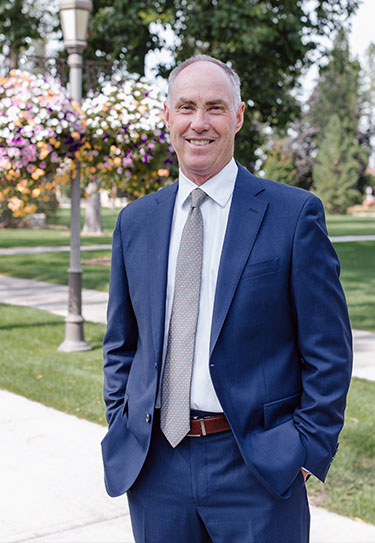President's Message

As I craft this contribution to the faculty newsletter, two items are especially visible through the windshield of my calendar: One, the request from Tara Tucker for this submission signals that summer is two-thirds behind us (sigh); and two, Janice and I will soon be in charge of three grandchildren for 96 hours (ages 7, 4 and 2), with the youngest somewhere (read: not far enough along) in the process of potty training. It’s been a bit more than two decades since we’ve had this sort of duty. No doubt we’ll be saying to one another, “How did we ever manage this?” In that spirit of summer pace and family fun, I hope you’ve had both aplenty since late May. The school year will soon be upon us. And that’s a good thing.
At the invitation of the Equal Justice Initiative, I spent three days in Montgomery, Ala., in July with a group of university presidents. I’m not sure how I made the invitation list – perhaps their need for geographical representation, or maybe it was my annual, pestering calls to EJI asking Bryan Stevenson to visit Spokane again as our guest for the President’s Leadership Forum. I don’t know. I didn’t ask questions. I just quickly confirmed my attendance.
In his 90-minute keynote, Stevenson emphasized the intentionality and purposes of “proximity,” particularly in terms of how barriers between people can be broken down. I can’t do justice to how he addressed issues of justice, so I won’t even try except to note these key points he made: that we are better when we invite people into relationship; that proximity demands we get close to people; that we bake “nearness” into how we function; that the capacity exists in us to do so; and that proximity roots and inspires us. Stevenson closed his time speaking about hope, the belief in what we have not yet seen, that the ground on which we walk is saturated with the hope of those who went before us.
On my trip home, thinking about Whitworth, I pondered the ways that proximity enhances the relationships formed between our faculty and students – students of all ages, across the full breadth of academic programs, proximate to you for these months and years, as you learn their lives and stories. What a privilege and blessing that position affords us. Your nearness to our students moves them to the terrain exalted in the hymn Higher Ground when the congregation sings, “Lord, plant my feet on higher ground.” Through exposing students to ideas and concepts, by helping them to develop analytical skills and become better communicators, and oftentimes through tending to their brokenness, you model the Lord’s proximity to us, that sense of heavenly “nearness.”
You, our faculty, teach toward human fullness, in relationship with our students, getting them to higher ground, for their sakes and the welfare of a world that could really use our graduates. Our students are lifted by this generation of Whitworth professors. As we enter a new academic year, I remain convinced that higher ground exists for this community and for our students – intellectually, relationally and spiritually.
With gratitude for your participation with our students, in proximity, with hope.
Scott